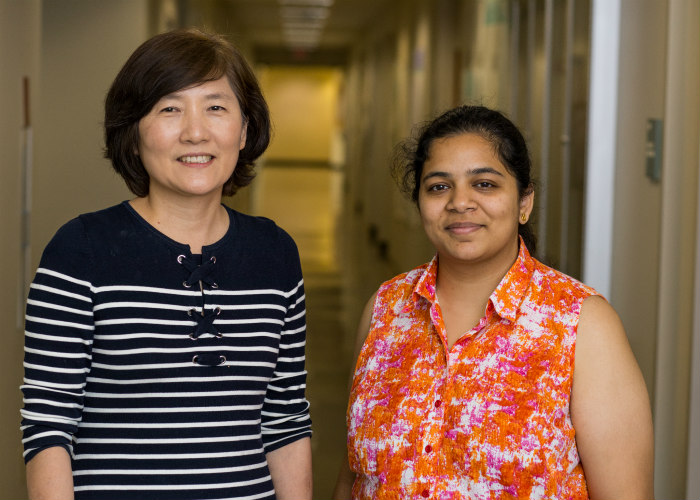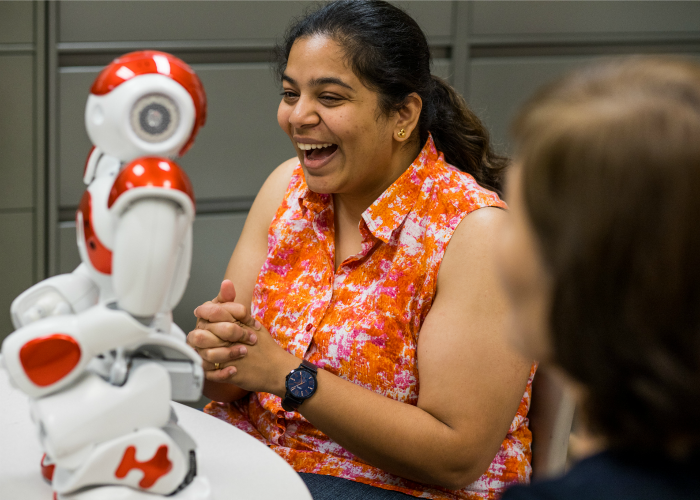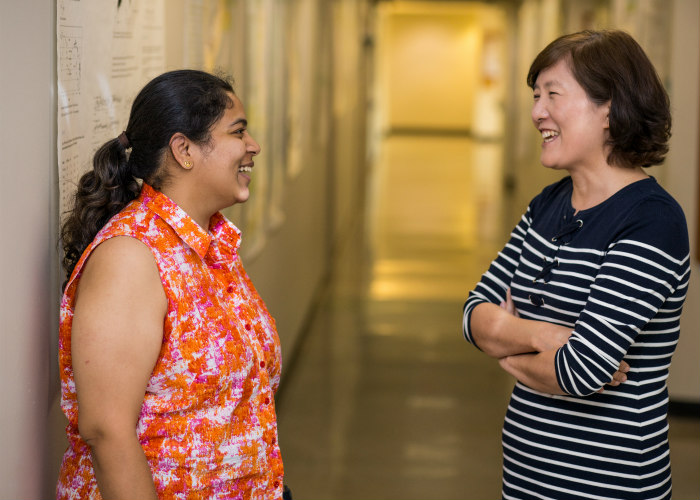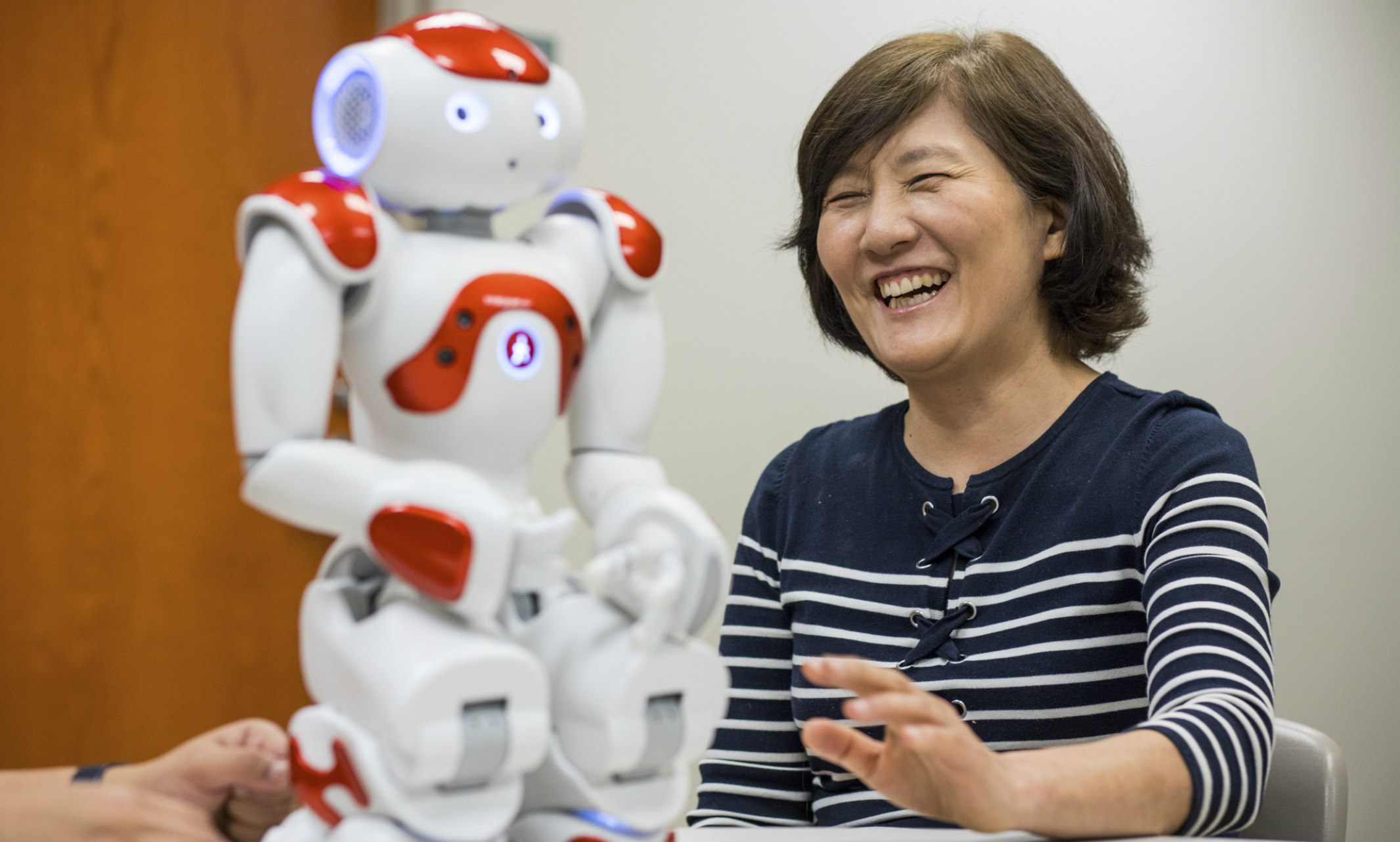The heart of UMKC is our campus community. With small class sizes and lots of opportunities, it’s easy to develop student mentorship teams. And these rich relationships—our Dynamic Duos—are some of our best success stories.
As an internationally-recognized expert in computer science, Yugi Lee, professor of computer science at the School of Computing and Engineering, says her motto is that teaching and research are not separate. Throughout her 20-year tenure at the SCE, she’s continued to mentor and equip her students to survive in any work environment – teaching or industry – an experience she said also helps to inform her research and make a difference for women in STEM following her footsteps. It’s her impact and engagement with students that landed Lee among Central Exchange’s 2019 STEMMy Award recipients.
Lee and mentee, Ph.D. student Mayanka Chandra Shekar, sat down to discuss the importance of mentorship and its significance for women in STEM.

What makes faculty mentorship critical to the success of students?
Lee: Students have their own goals. Sometimes they know what their goal is and they need someone to help guide and sometimes we help them identify their goals. That’s why it’s critical to have the right advisor, especially for graduate students. Sometimes their research may not be accepted, sometimes a project they’re working on may not go right and they get down. Additionally, mentorship is really important for female students in engineering where there aren’t many female faculty.
“In the last five years I’ve been at UMKC, our number of female Ph.D. students in computer science has significantly increased. When I joined the program there were three of us, now we have between 15 and 20!”
How has your mentor inspired you?
Chandra Shekar: How I perceive research is how Dr. Lee has taught me. She’s the most approachable faculty I’ve ever encountered. Every time there’s a new technology Dr. Lee says “let’s teach it,” because you become an expert through teaching.
I had limited exposure to research when I came to UMKC, but in my time here I’ve received a Google Lime scholarship, I’ve been selected to receive research funding from the School of Graduate Studies three times and has received the UMKC Women’s Council’s Graduate Assistance Fund scholarship five times.
Lee: Mayanka is one of the more popular students in our department. She’s got a lot of energy and fresh ideas. Her presentation is great and she can teach almost anything. She’s currently supervising 10 master’s degree students and mentors five project groups, and will apply to a faculty position when she graduates. She even received a scholarship to attend the Grace Hopper Celebration, which is one of the largest conferences for women in technology. She is applying to some faculty positions. I think she will land somewhere great.

What led you to UMKC?
Chandra Shekar: When I came to UMKC in 2014, I had limited exposure to research. Where I’m from, in India, UMKC had positive reviews. I am only one of two students from my master’s program who came to the United States.
One of two? Wow! How many of you were there?
Chandra Shekar: I received my bachelor’s and master’s degrees from a women’s college in India. We had 16 master’s students. Some are working, some got married and started families and two of us went on to pursue Ph.Ds. There just aren’t a lot of women in computer science. In the last five years I’ve been at UMKC, our number of female Ph.D. students in computer science has significantly increased. When I joined the program there were three of us, now we have between 15 and 20!
I’m getting married in December so I’ll be learning to juggle marriage and completing my program. I graduate in May.
"Teaching is part of the life cycle of research."
What qualities make a good mentor?
Lee: Understanding. It’s important to understand the student’s abilities and family situations. You have to be able to adjust to what’s going on with them and work with them to persist. Build a relationship with your students and be a support system for them. Finally, it’s important to be a good trainer and equip your students to be able to survive in any work environment – industry or teaching.
What’s your favorite part about being a mentor?
Lee: Relationships. I’ve overseen more than 20 PhD students in 20 years. Every year we have new faces coming in and sometimes I get students that challenge me in different ways. Each year students will have new questions, ideas, problems... Not all graduate students teach, but mine do. My philosophy is: teaching and research are not separate. Teaching is part of the life cycle of research.
“All of her hard work has made such a difference in the lives of many.”
How has your mentor helped you grow as a person?
Chandra Shekar: Dr. Lee has been a big source of support for me when I needed it – inside and outside of the classroom. When I was really sick, she supported me and motivated me to not want to stop learning. I was in the hospital coding! I was wheelchair-bound for a while and my mom came from India and stayed with me for close to a year. She and Dr. Lee helped me get around to my classes. They’ve been really fundamental women in my life.
If you’re giving advice to a student on finding a mentor, what would you tell them?
Lee: You have to meet every faculty member to find the best advisor or mentor. Sometimes without the right advisor, students won’t complete their degree program. You need good chemistry and you should have similar work styles. But if you don’t meet all the faculty, you won’t know who that person is.

Finally, Yugi, what does your Central Exchange recognition mean to you?
Lee: Recognition for women in STEM doesn’t come as often as it does for men. Computer science is a male-dominated field everywhere. I was the first female faculty member in our department only 20 years ago. While there are more women in the field than before, it’s important for women to have support systems. Central Exchange helps to create that. Women contribute a lot to STEM – we have a lot of creativity and pay close attention to detail…things you need in computer science.
Kevin Truman, dean of the School of Computing and Engineering, nominated me to receive a STEMMy Award and I’m honored to have been selected.
Truman said of Lee’s honor: “Yugi is so deserving of this award, SCE and I are proud to have her as one of our leading faculty. All of her hard work has made such a difference in the lives of many.”
Lee will receive the WISTEMM Educator Award for full-time faculty in STEMM fields at the STEMMy Awards ceremony on Sept. 17.

